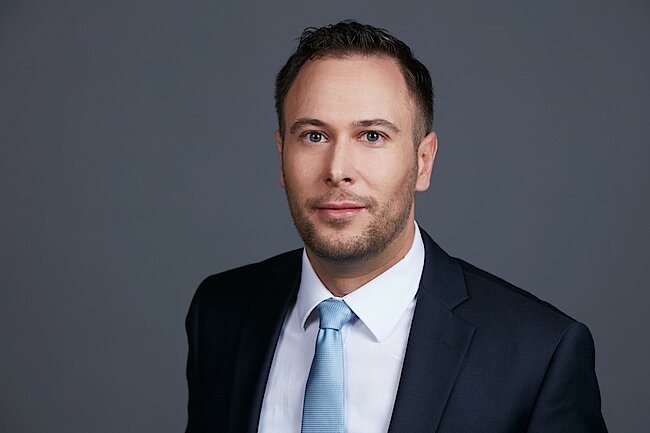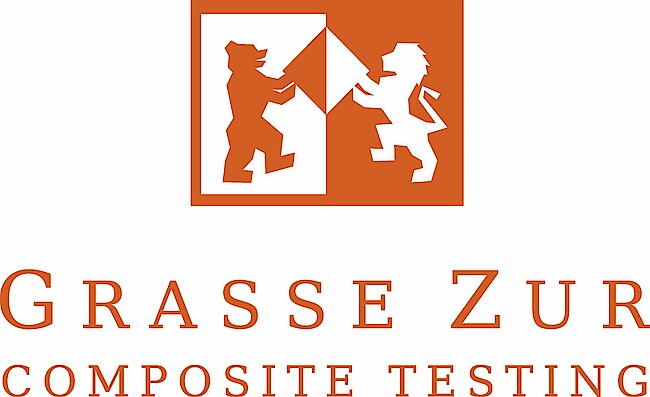Grasse Zur Composite Testing
-
Sector: TIC (Testing, Inspection, Certification)Testing of fibre-reinforced plastics and composites(quasi-static and cyclic destructive testing, fatigue testing, durability testing, thermal analysis and other testing methods as well as component testing)
-
Designation: Managing director
-
Established: 2011
-
Employees: 10
From science to entrepreneurship: Mr. Grasse, you came into contact with fibre-reinforced plastics as part of your doctorate, and a former colleague worked on a push frame. You yourself transferred the process to industrial application and, taking it further, founded a materials testing laboratory in 2013. What was/is your vision and motivation for going down this path?
Self-employment was always my professional desire. The focus is on the freedom of acting and acting independently and at the same time taking responsibility towards employees. The foundation of the company came about professionally towards the end of my time at the Federal Institute for Materials Research and Testing (BAM) in Berlin. The initial idea of selling shear test systems to industry developed into the foundation of a materials testing laboratory due to high demand, which has been accredited according to DIN EN ISO/IEC 17025 since 2017. What has always remained is the focus on fibre-reinforced plastics, whose market is constantly growing. The motivation for this comes from the daily contact with the employees and the clients, the constant mastering of ever-new challenges and the successful establishment of the company in the market.
Grasse Zur Composite Testing is a spin-off of the Federal Institute for Materials Research and Testing (BAM). What is the difference between a start-up and a spin-off?
A spin-off refers to a spin-off from a company. I founded Grasse Zur Composite Testing at the end of 2011 when I was still employed as a doctoral edge at BAM. The original idea was to transfer a newly developed method for determining the shear characteristics of fibre-reinforced plastics into industrial application. This has also been successfully achieved; the method has been standardized according to DIN EN ISO 20337 and is used internationally in various industries such as aerospace or wind energy. This contrasts with a start-up, which is usually financed by investors and for which regular financing rounds are carried out due to disproportionately rapid growth. Typical here is a disruptive approach to displace competitors. Grasse Zur Composite Testing is not a start-up, but was founded in the traditional way and is 100 per cent owner-managed. The focus is on the long-term and sustainable establishment in the market and not on rapid growth.
What steps were crucial to transferring your product from science to industry?
First of all, the very good preliminary work at BAM was decisive and produced an excellent idea. This idea was so good that the company BASF wanted to buy the product, which until then had only been available as a prototype, as an initial customer. At that time, there was neither standardization of the process nor patent protection. Through cooperation with the industry association CC e.V. (now Composites United e.V.) and the German Institute for Standardization (DIN), the conditions were created for a transfer to industrial application. The establishment of the laboratory in 2013 then convinced an increasing number of industries and clients of the advantages of the test method.
What role did the close cooperation with DIN or the standardization of the shear test method with DIN SPEC play in the course of founding the company?
Without good cooperation with DIN, the procedure would not have been standardized so quickly. And only through standardization has the test method made it into the certification of rotor blades for wind turbines. This would not have been possible without a test standard. It is primarily through its establishment in the wind energy sector that the test method has made it to an international application. The preparation of the former DIN SPEC 4885 took only about six weeks. The subsequent preparation of DIN EN ISO 20337, on the other hand, took several years, since the various secretariats had to be involved at the international level. In 2014, we received the Berlin-Brandenburg Innovation Award and the DIN Innovation Award for transferring the process to industrial application.
What personal competencies (in the sense of mindset) are needed to successfully take an idea from science to the industrial application? Can anyone become an entrepreneur?
In my opinion, anyone can become an entrepreneur, because no one is born an entrepreneur. What is needed above all is perseverance, decisiveness and the ability to reflect. Because only through self-critical questioning and regular reflection on one's own actions can decisions made be evaluated and, if necessary, revised, which is essential for a young company. The saying "First, things turn out differently, and second, things turn out differently than you think" proves true for every entrepreneur on a daily basis.
What advice and/or decision-making aid would you like to give to interested parties on their way to founding a company?
My advice is: "Just do it!". If you are convinced you have a good idea, you should just go for it especially if you're young. Because once you get used to a regular income, which is rare at the beginning of a business start-up, and maybe you still have a family to support, self-employment becomes more and more difficult the older you get. And even if it is true that you work yourself and all the time, there is hardly anything better, because working is so much fun and is rarely perceived as such.
Thank you Mr. Grasse for taking the time for our interview. We wish you and your team all the best for the future.
![[Translate to English:]](/fileadmin/_processed_/f/0/csm_logodgm-4_b2722eeace.png)
![[Translate to English:]](/fileadmin/user_upload/logodgm-4.png)

